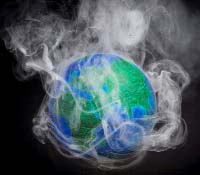
AFP :
The carbon dioxide emissions that drive global warming, flat since 2014, are set to rise two percent this year, dashing hopes they had peaked, scientists reported at UN climate talks Monday.
“This is very disappointing,” said Corinne Le Quere, director of the Tyndall Centre for Climate Change Research at the University of East Anglia and lead author of a major study detailing the findings.
“With global CO2 emissions from human activities estimated at 41 billion tonnes for 2017, time is running out on our ability to keep warming below two degrees Celsius (3.6 degrees Fahrenheit), let alone 1.5 C.”
The 196-nation Paris Agreement, adopted in 2015, calls for capping global warming at 2 C below pre-industrial levels. With the planet out of kilter after only one degree of warming-enough to amplify deadly heatwaves, droughts, and superstorms-the treaty also vows to explore the feasibility of holding the line at 1.5 C
The carbon dioxide emissions that drive global warming, flat since 2014, are set to rise two percent this year, dashing hopes they had peaked, scientists reported at UN climate talks Monday.
“This is very disappointing,” said Corinne Le Quere, director of the Tyndall Centre for Climate Change Research at the University of East Anglia and lead author of a major study detailing the findings.
“With global CO2 emissions from human activities estimated at 41 billion tonnes for 2017, time is running out on our ability to keep warming below two degrees Celsius (3.6 degrees Fahrenheit), let alone 1.5 C.”
The 196-nation Paris Agreement, adopted in 2015, calls for capping global warming at 2 C below pre-industrial levels. With the planet out of kilter after only one degree of warming-enough to amplify deadly heatwaves, droughts, and superstorms-the treaty also vows to explore the feasibility of holding the line at 1.5 C

